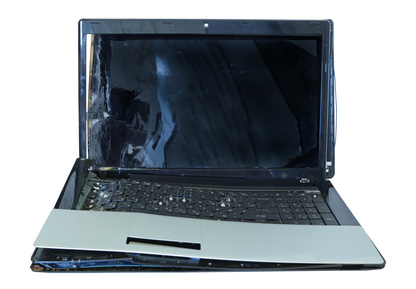Case 1 – A Bank Field Examiner closed the lid for 3 days without backing up and the drive got corrupted and crushed the work in the file.
Case 2 – Bank had a bad batch of computers with a hard drive failure rate of about 30% in the first year.
Case 3 – Field Examiner got hit with a computer virus that wiped the hard drive and it could not be rebooted.
Case 4 – Field Examiner had their car broken into while at dinner and the laptop was stolen.
Case 5 – Something like this happens to you. Are you prepared to get the data back?
Too Busy for Common Sense…
Real Estate has the Realtor adage Location, Location, Location but of course you might not want to live in a shack. Backups are the broken record voice of “You should do it several times a day.. Backup, Backup, Backup…” being met by your mental resistance of “Shut up IT Geek, I’m too busy to do that!” Of course you might not want to explain losing a week of work to your boss or the Borrower with the excuse that you were too busy.

The Value of Data:
The value of data is DIRECTLY proportional to the time and
expenses spent gathering it and working with it
Imagine that you bill $1.00 per minute of $60.00 per hour. A lot of the time you bill for is at much higher rates than that. Suppose you lose 3 days of work from not having backups. That’s $1.00 X 60 minutes X 8 Hours X 3 Days or $1,440.00 of lost value. Add two more nights at a hotel, plus food, plus a rental car for the extra three days and you just added another $500.00 to the bill bringing us to $1,940.00. Call that $2,000.00, we all like round numbers.
Try to explain this loss of time and increased expense to the Borrower or your boss. You might look like a zero yourself? What if the loss of data was a whole week or two weeks? You’re thinking “OMG, Noooooooooooooooo!,” but you’re also thinking, not me.
What Goes Wrong?
You will never be able to convince me that people wake up in the morning and declare “I’m going to fail today!” That is not human nature. More likely and unpredictable worse case scenarios could include dropping the laptop computer, users pulling network cables or USB backup drives while things are saving, hard drive failures, loose batteries killing power for a fraction of a second and shutting down during saves and other gotcha’ things that cause files to become scrambled and corrupted or lost completely.
The worse case includes other possibilities that you cannot predict such as a car break-in or theft, spilled coffee, hotel room robbery or some other loss of the computer or computer functionality. You can guess that over-time things will go wrong and attempt to be prepared to deal with it. Failure is part of life, it is how you deal with it that matters.
ALWAYS Backup When…
You need good habits and it must go beyond closing the lid on the computer because hibernate works so well for you most of the time. Disciplined, always, smart good habits that are more than closing the lid. This is simple, ALWAYS backup when going to lunch, when leaving for the night, when traveling home. This includes backing up when working at the office or at home. ALWAYS:
- Going to lunch
- Leaving work
- Before traveling
But is it a Backup?
We need a definition of what a backup is to get this right:
A Backup is a copy of the original files and folders
to both a device that is not part of the computer
that created it, AND is physically separated from it.
Break it down…
Copy… to a device that is not part of the computer that created it – Making a second copy onto the same computer hard drive will not help you when the hard drive crashes, when the computer is stolen, when you spill coffee all over the computer or drop it hard. Therefore, the copy must be placed somewhere else besides the computer that created it.
AND is Physically separated from it – Copying to a USB drive that you put in your laptop bag is not separated from the computer. What if you are mugged? What if the car is broken into or stolen?
Organize and Backup What?
Backup your data as priority #1. Sure you can do a full backup and restore with a backup drive or specific cloud services, but this Blog is not all about a full restore, rather it is about the data that you spent all that time creating.
Some users partition their hard drives so that instead of having just drive C (one partition), they have drive C and D split on the one physical hard drive in the computer. The strategy is that the programs go onto drive C and the data goes onto Drive D and then you backup only your data (all of D). There are programs, including Windows, that let you change the partition size and splits.
Incremental backups are when you only backup the files that change and this is the most efficient thing to do, specifically for field examiners that are traveling and only changing a few files during the week. Certainly backup the Exam folder that you are working on that week.
Backup to What Place?
 Glad you asked. There are lots of solutions to this and some are better than others:
Glad you asked. There are lots of solutions to this and some are better than others:
Drives – Backup to a USB drive or portable backup device drive. These can get lost or be stolen and it is tough to keep them separated from the computer bag. It is certainly better than nothing at all and backup data is at least not on the hard drive of the computer.
E-Mail – Send the file to yourself, perhaps to your office email or Google e-mail Etc. YOU must have an Internet connection and YOU must manually do the upload.
Cloud Drives for Backup – Virtual drives like DropBox, OneDrive, Google Drive and others. That requires an Internet Connection or tethering to your cell phone to get the upload, but it is at least out of the building and backed up. YOU must have an Internet connection and YOU must manually do the upload, but you could synchronize folders instead…
Cloud Drives for Files in Use to be Synchronized to the Cloud – Virtual drives like DropBox, OneDrive, Google Drive and others will synchronize your files as they change. You store your working file on your hard drive, but it is linked as a synchronized folder. As your file changes, the cloud drive gets updated. You have two copies; one local on your computer and one in the cloud drive. YOU must have an Internet connection or tethering to your cell phone for this to work.
VPN – A lot of Lenders and companies setup a VPN to share and move files. This form of backup is like the Cloud solution, but you own the servers. YOU must have an Internet connection and YOU must manually do the upload.
Backup Services – There are good services out there like Barracuda, Carbonite, iDrive, Etc. These plans offer a range of daily backups and as-you-work backups. The as-you-work options are the way to go. YOU must have an Internet connection for this to work, but the settings control the backup frequency and thus it is more automated. This does you no good, to do a daily backup that is scheduled for a time that you are driving home, or when you have no Internet connection at all.
Almost Done… Username and Passwords and Scans
I could Blog about this stuff in another post, but I’ll keep it short.
- Username – NEVER-EVER-NEVER use ADMIN or ADMINISTRATOR as the username for anything. This common name is a default that is commonly used by routers and other products and hackers know this. Make it unusual and not something that someone would ever guess. NOT your name.
- Passwords – Upper and lower case letters, numbers, symbols and make it LONG. Anything less than 15 characters is not good enough. Combine words to make up new words, add numbers and keyboard symbols… DOUBLE it to make it twice as long. First letter of each word of your favorite song lyrics or bible quote plus numbers and keyboard characters as long as it is obscure and not predictable. Unusual, mixed with letters, numbers and symbols and of course at least 15 characters long. Don’t use Admin and then your dog’s name (Fido). DO be paranoid and diligent here.
- Virus Scanners and Malware Scanners – NEVER disable your scanners and password protect the settings in them. All files will be inspected by the scanners as you get them from e-mails, file saves, Etc. A computer virus, worm Trojan, Etc. will try to kill-off the scanner first and password protection prevents that if a new one comes through undetected (to be crushed in a future scan). Ransomware and other data killers mean that you could need those backups even with scanning diligence.
Finally
 You don’t want to be the “Zero,” you want to be the “Hero.”
You don’t want to be the “Zero,” you want to be the “Hero.”
Backup, Backup, Backup.
Copyright © 2017 Clear Choice Seminars, Inc. All Rights Reserved
Images licensed from Fotolia.com

